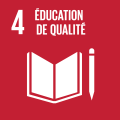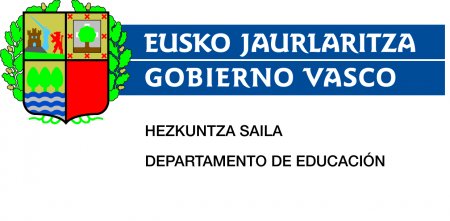
ONLINE IKASTAROA ZUZENEAN-Matematika eta Zientzien Hezkuntza: Heziberri Curriculuma, metodo kognitibo berritzaileen bidez
Description
This Course will be taught through live online sessions through the Moodle and Zoom platforms. From the Secretary's office, all information and assistance to enter the platform will be provided.
Diagnosis of progressive worsening E17: ISEI-IVEI reports in June 2018: a) Since 2011 the mathematical proficiency in 4th grade of E. Primary presents a progressive worsening; b) In 2017 an increase in the percentage of students who obtain the lowest level of competence is detected. These diagnoses appear in the executive report on the situation of basic education called Diagnostic Evaluation, E17, carried out by the Basque Institute for Educational Evaluation and Research (ISEI-IVEI), the Education Inspection and teacher support services (Berritzegune ).
Purpose and use of the E17 report: This evaluation of ISEI-IVEI is used by the Basque Government Administration to guide its educational policies and for the design, implementation and review of strategies and action programs. It is also used by educational centers for the critical review of their teaching-learning processes and development of their improvement plans. And finally it is used by families to know the progress of their children in mid-stage.
Additional Diagnostics: This report together with other external reports such as the OECD PISA report (international standardized assessment that applies to 15-year-old students to assess reading, math and science performance) warn of the need to address the problem of improving the mathematical competence of our young students.
Improvement Proposal: The Administration and the teaching staff continue to propose and use obsolete and deficient pedagogical methodologies in two fundamental areas: computational complexity of mathematics and science, and cognitive abilities of students. In this course these two deficiencies are analyzed in detail and a strategy to solve them is proposed.
Innovative Methodology: In this Course we present the Cognitive Computing (symbol manipulation to obtain the solution to the problems, and knowledge of the computational potentials / limitations of the human brain) and apply it for the development of the mathematical and scientific competences of Basic Education.
Curriculum Structure: Computationally all the problems of Basic Education (we include all problems in the areas of Science, Technology, Engineering, Art and Mathematics (STEAM)) have a common, but unknown, and therefore unused characteristic that has the potential to solve this situation of the quality of education. This feature is that all problems respond to the resolution model called type-A problems.
Cognitive Concepts: An appropriate education to these issues requires knowledge of this problem model and a teaching method specially designed for its resolution. The proposed teaching method is based on Cognitive Computing and has two fundamental cognitive concepts: minimal set (MS) or minimum set, and cognitive virtual machine (MVC).
Practical Course: This Course presents this type-A model of problems, and the pedagogical methodology for appropriate teaching.
It is a practical Course in which the principles of this paradigm are illustrated with examples from the Heziberri 2020 curriculum: 1) it shows how all Heziberri 2020 problems respond to the model of Type-A problems; and 2) the teaching method of this pedagogical model defining the minimal set (MS) of a dozen curricular subjects and the cognitive virtual machines (MVC) for their learning are illustrated with concrete examples of Heziberri 2020.
Course dynamics: the Course is organized in sessions. In each session the teaching team and the students participate dynamically and collaboratively (IKD) in the development and practice of the session. The 6 sessions of the course are as follows:
1. Cognitive Computing and Basic Education Curriculum
2. Numbers and Algebra;
3. Geometry and Measurement;
4. Functions and Graphs;
5. Statistics and Probability
6. Troubleshooting
After the Course: Participants in this course will return to their classrooms equipped with tools that allow them to know in depth the structure of the Heziberri 2020 curriculum in terms of type-A problems and represent this structure in the new pedagogical model. This will be done using the concepts of minimal sets and cognitive virtual machines studied in the Course. Course participants can also apply these pedagogical concepts and instruments with their students in the classroom with the purpose of immediately assessing the fruits of this new process of cognitive computing.
Objectives
Parte-hartzaileek sakon ezagutuko dute Heziberri 2020 plana matematika eta zientzien arloetan: zein diren haien gaitasunak eta nola dauden lotuta elkarren artean (Lehen Hezkuntzako 6 maila eta Bigarren Hezkuntzako 4 maila).
Parte-hartzaileek irakasteko estrategia berritzaileak garatzen ikasi eta praktikak egingo dituzte, Heziberri 2020ren helburuak arrakastaz lortzeko. Estrategia berritzaile horiek konputazio kognitiboaren teorian oinarritzen dira.
Estrategia berritzaile horiek Heziberri 2020 curriculumean txertatzeko praktikak egingo dituzte parte-hartzaileek. Praktika horiek sei ezagutza-arlo izango dituzte (ikusi xehetasunak laburpenean).
Parte-hartzaileek Heziberri konpetentziak eta Eusko Jaurlaritzako Hezkuntza Sailaren Steam ekimenean sartutako bost arloak (Ingeniaritza eta Artea barne) integratzeko praktikak egingo dituzte.
Activity directed to
- University student
- Teachers
- Directores y Personal de Centros Educativos
Program
08-06-2020
Presentation by the Director of the activity
- Xabier Basogain Olabe UPV/EHU - Profesor
“Sesión 1ª - Aplicación de teorías de Computación Cognitiva en el Currículo de la Educación Básica “
- Juan Carlos Olabe Basogain CBU - Profesor
- Urtza Garay Ruiz UPV/EHU - Profesora
- Ainara Romero Andonegui UPV/EHU - Profesora
Break
“Sesión 2ª - Alfabetización numérica y algebraica: más allá de los números, símbolos y operaciones aritméticas“
- Miguel Ángel Olabe Basogain UPV/EHU - Profesor
- Arantzazu López de la Serna UPV/EHU - Profesora
- Eneko Tejada Garitano UPV/EHU - Profesor
Break
“Sesión 3ª- Las formas y las medidas: modelando el mundo que nos rodea a través de la geometría euclidiana y cartesiana“
- Xabier Basogain Olabe UPV/EHU - Profesor
- Naiara Bilbao Quintana UPV/EHU - Profesora
- Javier Portillo Zalla UPV/EHU - Profesor
“Sesión ONLINE Día 1 “
- Xabier Basogain Olabe UPV/EHU - Profesor
- Juan Carlos Olabe Basogain CBU - Profesor
09-06-2020
Presentación del Programa para el Día 2
“Sesión 4ª- Relaciones y representaciones de la información: funciones y gráficos como herramientas de análisis“
- Xabier Basogain Olabe UPV/EHU - Profesor
- Ainara Romero Andonegui UPV/EHU - Profesora
- Urtza Garay Ruiz UPV/EHU - Profesora
Break
“Sesión 5ª- La incertidumbre y los datos: estudiando el mundo estocástico a través de la estadística y la probabilidad“
- Miguel Ángel Olabe Basogain UPV/EHU - Profesor
- Arantzazu López de la Serna UPV/EHU - Profesor
- Eneko Tejada Garitano UPV/EHU - Profesor
Break
“Sesión 6ª - La competencia matemática y científica: estrategias cognitivas para resolver problemas complejos“
- Juan Carlos Olabe Basogain CBU - Christian Brothers University - Profesor
- Naiara Bilbao Quintana UPV/EHU - Profesor
- Javier Portillo Zalla UPV/EHU - Profesor
“Sesión ONLINE Día 2“
- Xabier Basogain Olabe
- Juan Carlos Olabe Basogain
Directors

Xabier Basogain Olabe
Universidad del País Vasco / Euskal Herriko Unibertsitatea, Subdirector de Relaciones con la Empresa
Full Professor of the University of the Basque Country - Euskal Herriko Unibertsitatea. Telecommunications Engineer from the Polytechnic University of Madrid, and Doctor of Telecommunication Engineering from the University of the Basque Country - Euskal Herriko Unibertsitatea. Member of the Systems Engineering and Automation Department of the School of Engineering of Vitoria-Gasteiz. He has taught courses in digital systems, microprocessors, digital control, systems engineering, modeling and simulation of discrete events, machine learning, and synchronous collaboration tools in education. His research activities include the areas of: a) soft computing and cognitive science for STEAM; b) learning and teaching technologies applied to online education; c) virtual and augmented reality with mobile technologies. ORCID ID: 0000-0002-6672-6897
Speakers

Naiara Bilbao Quintana
PhD in Educational Innovation from the University of Deusto. She is currently an assistant professor at the University of the Basque Country (UPV/EHU) and a member of the Department of Didactics and School Organization. She has taught courses to active teachers on Educational Innovation, Curriculum Development, Competency Assessment, Teaching for Understanding and Visible Thinking, among others. Her research activities link Educational Technology with the areas of Teaching for Understanding and Visible Thinking. Furthermore, her interests are focused on curriculum development, self-regulation of learning and educational innovation processes.
Urtza Garay Ruiz has a PhD from the University of the Basque Country and a postgraduate degree in Multilingual Education from the University of Barcelona. She is a professor and Director of Methodological Innovation at the University of the Basque Country-Euskal Herriko Unibertsitatea. He is also a member of the consolidated research group of the “Weblearner” on technology and education. He has participated in competitive research projects of the Ministry of Education and Science, the Basque Government and UPV / EHU. In addition to coordinating and participating in Teaching Innovation Projects and has published teaching material for Primary, Secondary and University Education. His lines of research are MOOCs, PLE, RA, Educational Technology and Multilingual Education. She has made contributions to various national and international conferences and has published chapters in books and articles in educational research journals of high international impact.

Arantzazu López de la Serna
UPV/EHU
Associate Professor of the University of the Basque Country - Euskal Herriko Unibertsitatea. Degree in Pedagogia from the University of Deusto.Degree in teaching from de University of Mondragon and Doctor from the University of the Basque Country - Euskal Herriko Unibertsitatea. Member of the Department of Didactics and School Organization. (UPV/EHU) He has taught courses in Innovation and technology, Prevention in education, Gender and technology. His research activities include the areas of: a) Educational innovation; b) Gender and technology; c) Prevention and risk reduction in educational contexts; d) MOOC and SPOOC courses. Place: Faculty of Education of Bilbao, UPV / EHU ORCID ID: 0000-0002-9297-8641

Juan Carlos Olabe Basogain
Juan Carlos Olabe is professor of Electrical and Computer Engineering at Christian Brothers University (CBU), in Memphis TN., USA. He holds a PhD in Telecommunications Engineering by the Polytechnic University of Madrid. He has taught courses in Electromagnetic Field Theory, Data Communications, Data Structures, and Data Base Design. His research activities include the areas of: a) computer network design; b) digital design; c) computational thinking and cognitive processes; and d) learning and teaching technologies applied to online education.

Miguel Ángel Olabe Basogain
Professor at the University of the Basque Country - Euskal Herriko Unibertsitatea. Doctor Industrial Engineer from the University of the Basque Country, and member of the Communications Engineering Department of the School of Engineering of Bilbao. He has taught courses in computer architecture, programming, modeling and simulation of networks, multimedia services, and creation and distribution of multimedia content in education. His research activities include the areas of: a) Soft Computing and cognitive science for STEM; and b) learning and teaching technologies applied to online education. Place: School of Engineering of Bilbao, EHU Office: 3A19 Telephone: 34 946014211 E-mail: miguelangel.olabe@ehu.eus

Javier Portillo Zalla
Professor of the University of the Basque Country - Euskal Herriko Unibertsitatea (Faculty of Education of Bilbao). Doctor in Telecommunications Engineer from the University of the Basque Country. Former member of the Department of Systems and Automation Engineering of the School of Engineering of Bilbao. Currently in the Department of Didactics and School Organization of the Faculty of Education. He has taught courses on programming, microprocessors, digital control, systems engineering and asynchronous tools for collaboration in education. His research activities include the areas of: a) PLE and PLN; b) Learning Analytics, Educational Data Mining and Social Network Analysis (SNA); c) Machine Learning.

Ainara Romero Andonegui
Euskal Herriko Unibertsitatea, UPV/EHU
Associate Professor of the University of the Basque Country - Euskal Herriko Unibertsitatea. Degree in Psychology from the University of Deusto and Doctor in Education from the University of the Basque Country - Euskal Herriko Unibertsitatea. Member of the Department of Didactics and School Organization. She has taught courses in digital competence, educational technology and active methodologies. Her research activities include the areas of: a) Learning and Knowledge Technologies b) Personal Learning Enviroment c) Massive Open Online Course eta d) Oral and written language acquisition. Place: Faculty of Education of Bilbao, UPV / EHU ORCID ID: https://orcid.org/0000-0002-0132-9508

Eneko Tejada Garitano
Associate Professor of the University of the Basque Country - Euskal Herriko Unibertsitatea. Degree in Psychopedagogy from the University of Deusto and Doctor from the University of the Basque Country - Euskal Herriko Unibertsitatea. Member of the Department of Didactics and School Organization. He has taught courses in digital competence, educational technology and active methodologies. His research activities include the areas of: a) long life learning; b) Creation of personal learning environments; c) virtual and augmented reality with mobile technologies; d) creation of Massive Open Online Course. Place: Faculty of Education of Bilbao, UPV / EHU ORCID ID: 0000-0002-6013-222X
Summary
Conclusions sent by the direction of the Summer Course
Sustainable development goals
Agenda 2030 is the new international development agenda approved in September 2015 by the United Nations. This agenda aims to be an instrument to favour sustainable human development all over the planet, and its main pillars are the eradication of poverty, a reduction in equality and vulnerability and fostering sustainability. It is a unique opportunity to transform the world up to 2030 and guarantee human rights for all.

4 - Quality education
Guarantee quality education that is inclusive and equitable and foster opportunities for lifelong learning for everyone. Key issues: free-of-charge, equitable and quality education, access to higher education and training on an equal basis, education for sustainable development, suitable education centres for persons with disabilities, and safe, non-violent and efficient learning environments.
More information






